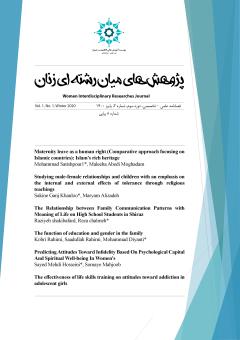-
-
List of Articles
-
Open Access Article
1 - Investigating the mediating role of couples communication styles in the relationship between safe and insecure attachment styles and forgiveness in the family in married women
reza chalmeh fatemeh abdolahi sanaz bageri -
Open Access Article
2 - Conceptual Modeling of Female Genital Mutilation Complications in Kermanshah: a Grounded Theory Study
osman mahmoudi -
Open Access Article
3 - Predicting the quality of women's marital relationships based on personality traits and emotional malaise
Raziyeh alsadat Makiyan samira karami ensiyeh abkar -
Open Access Article
4 - Comparison of Spiritual Health and Psychological Helplessness in Adolescent Girls from Divorced and Normal Families in Shiraz
zahra Ghaedian soode dashtiane Nasir Dastan -
Open Access Article
5 - The Mediating Role of Self-compassion in the Relationship Between Self-concept and Body Image and Social Anxiety in Female Students of Isfahan University of Technology
Behnoush Harouni hassan khoshakhlagh -
Open Access Article
6 - Investigating the Relationship of Parenting Styles with Parents’ Sexual Knowledge and Attitude and the Level of Interest in Talking about Sexual Issues in Shirazi Families
Soheila Bastani Mitra Safakish
-
The rights to this website are owned by the Raimag Press Management System.
Copyright © 2017-2025







